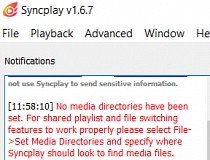

- #Syncplay trust how to#
- #Syncplay trust zip file#
- #Syncplay trust password#
- #Syncplay trust zip#
- #Syncplay trust free#
#Syncplay trust zip#
Here is a detailed diagram on how ZIP files are stored, though this is not needed as the libraries will handle all the heavy lifting for us – The structure of a PKZip file (jmu.edu)
#Syncplay trust zip file#
What this means is that we can download specific parts of the ZIP file where the names are stored, rather than the data itself. This is why we need to use the API – this allows us to get a Seekable Stream against a File stored in Azure Storage Account. The reason is that although HttpClient does allow us to access an HttpRequest as a Stream, the Stream itself isn’t seekable (CanSeek: false). Unfortunately, using our beloved HttpClient isn’t possible (or at least, I didn’t research enough). The aim is to get all the entry names of ZIP files stored on an Azure Storage Account. In the end of the day, we solved this in a totally different way, but I remained curious if this is possible, and it sure is. We had terabytes of data to go through and downloading them was not really an option. Recently, I was working on a task where we had to get file entries and names off ZIP files stored on Azure. Of course, I understand that Bitwarden, as a company, is there to make money at the end of the day, but I feel that profits are coming in at the expense of giving people a proper secure platform to trust literally all their online (and offline) secrets, which is a bit of a shame! In all fairness, the subscription for a year is very low at only $10 which solves the auditing issue and better 2FA capabilities.įortunately, this is all hypothetically, but this kept me up all night, literally.
#Syncplay trust free#
#Syncplay trust password#
Actually, I have no idea whether they check your username and master password – and I don’t want to compromise my account to verify whether this exists. But this is locked for premium users only, listed under Vault Health Reports. What do I mean? Bitwarden does offer some kind of audit, like LastPass did.

So, now, there is a price tag against your online security. Actually, scratch that, it PROBABLY does exist on the internet! Can you verify this? Yes, but you have to pay unfortunately. Here’s the problem though, the key to access all this data might already exist on the internet. Bitwarden stores all your secrets, all username, passwords, maybe some secure notes, some credit card details.

What’s Bitwarden? Bitwarden is probably the most commonly used Password Manager, after LastPass decided to slash the free tier.
#Syncplay trust how to#
You’re just trusting that people don’t know how to look for these keys, and it helps you sleep soundly at night.This, well, the above, is Bitwarden. Also, a LOT of copies of the keys lie hidden away, somewhere – if you really know how to look, they’re there. This box is sitting in a very public place, say your city’s park. Imagine this – you got all your secrets stashed in a box, that requires a key.


 0 kommentar(er)
0 kommentar(er)
